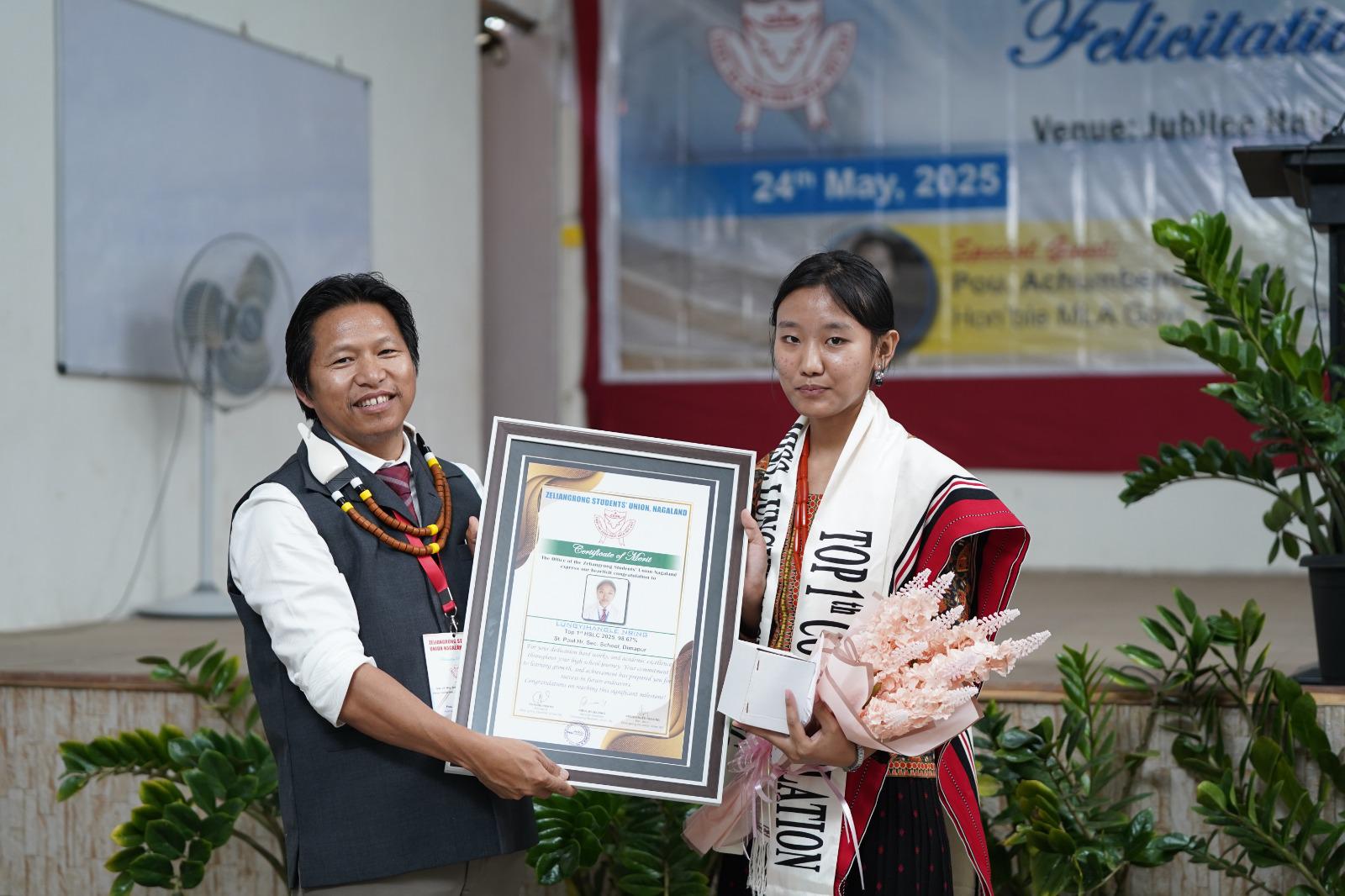WEDNESDAY, MAY 28, 2025
- Home
- Naga People’s Front legislator proposes shift from job to educational reservation
Naga People’s Front legislator proposes shift from job to educational reservation
Published on May 25, 2025
By EMN
Share

Achumbemo Kikon felicitates NBSE HSLC topper Lungyihangle Nring on May 24.
- DIMAPUR — Naga People’s Front (NPF) legislator Achumbemo Kikon has called for a paradigm shift in Nagaland's reservation policy by way of gradually shifting reservation in government jobs to the education sector instead.
- Addressing a felicitation programme organised by the Zeliangrong Students’ Union Nagaland St. Xavier Parish Church in Jalukie on May 24, Kikon outlined a new approach centred on socio-economic upliftment and infrastructure-based support rather than tribal classification.
- The event was held to honour NBSE HSLC Rank 1 topper Lungyihangle Nring from St. Paul Hr. Sec School, Dimapur, who scored 98.67%, along with other meritorious HSLC and HSSLC students from Zeliangrong community.
Also read: Five Nagaland tribes set to launch protests over Reservation Policy
- While lauding their achievements, Kikon suggested that such academic excellence should compel the community to re-evaluate its continued classification as a Backward Tribe.
- Despite celebrating the community’s accomplishments—including past toppers and trailblazers like the late freedom fighter Haipou Jadonang and the first Naga nuclear scientist Chireuding Zeliang—Kikon expressed concern that the community still remains under the backward category.
- He suggested that the label may no longer reflect current realities and called for a reassessment of what backwardness means today.
- Arguing that job reservations alone no longer serve their intended purpose, Kikon proposed that the focus should now be given to the education sector “by providing more well-equipped teachers to the remote areas and the necessary tech required for educating the students.”
- He pointed out that many individuals who once benefited from job reservations now have access to opportunities and resources, placing them in the so-called "creamy layer" who no longer require such benefits.
- Instead, he said, the system should target those still struggling due to lack of access to education and infrastructure.
- To address this, Kikon put forward a three-point proposal: the current backward quota system should continue for a limited period—two to three years—while awaiting the completion of the next Census; after that, “change the job reservation into educational reservation”; and provide a special incentive or scholarship programme targeting specific backward pockets.
- According to Kikon, this shift would enable students from backward regions to catch up with their peers in more developed areas, helping bridge the educational divide.
- Also, Kikon lauded the INICIO Foundation as a model, praising the organisation for recognising three students from remote regions who overcame significant hardships to pass their HSLC exams. He remarked that such support systems truly embody the original intent behind reservation policies.
- He highlighted the relatively better infrastructure of Jalukie and surrounding areas, which benefit from proximity to both the state capital Kohima and commercial hub Dimapur. These advantages, he asserted, underscore the need to adopt a more nuanced, region-specific approach to development and reservation.
- He called for unity among the Zeliangrong sub-tribes—Zeme, Liangmai, Rongmei, and Inpui—and urged the community to lead by example in embracing change for a more equitable future. He stressed that a united, forward-thinking Zeliangrong community could play a vital role in strengthening the larger Naga society.

